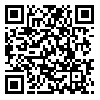Volume 10, Issue 4 (Winter 2024)
johe 2024, 10(4): 295-306 |
Back to browse issues page
Research code: 112805
Ethics code: IR.GOUMS.REC.1401.407
Download citation:
BibTeX | RIS | EndNote | Medlars | ProCite | Reference Manager | RefWorks
Send citation to:



BibTeX | RIS | EndNote | Medlars | ProCite | Reference Manager | RefWorks
Send citation to:
Heidari A, Kahe H, Jafari N, Khatirnamani Z. Perceived Mental Workload Status and its Relationship with Patient Safety Culture in the Nurses of Educational and Therapeutic Centers of Gorgan, Iran, in 2022. johe 2024; 10 (4) : 6
URL: http://johe.umsha.ac.ir/article-1-907-en.html
URL: http://johe.umsha.ac.ir/article-1-907-en.html
1- Health Management and Social Development Research Center, Golestan University of Medical Sciences, Gorgan, Iran , alirezaheidari7@gmail.com
2- Health Management and Social Development Research Center, Golestan University of Medical Sciences, Gorgan, Iran
2- Health Management and Social Development Research Center, Golestan University of Medical Sciences, Gorgan, Iran
Abstract: (3611 Views)
Background and Objective: Perceived mental workload is a set of factors that affect the mental processes of information processing, decision-making, and individual reactions in the work environment. Patient safety refers to the prevention from injuries caused by medical errors that occur due to negligence in performing duties. The present study was conducted to determine the perceived workload and its relationship with the culture of patient safety in nurses.
Materials and Methods: This analytical cross-sectional study was conducted among the nurses of Shahid Sayad Shirazi and 5 Azar teaching hospitals in Gorgan, Iran, in 2022. In total, 280 nurses from the mentioned hospitals participated in the study. The random stratified sampling was applied, and the Ethics Code was obtained. The data were collected by means of mental workload and patient safety culture questionnaires and were analyzed using descriptive and inferential statistics methods in SPSS software (version 24).
Results: The average age and standard deviation of the nurses was 34.9 ± 9.2 years. Most nurses had a bachelor's degree (90.4%) and were married (71.6%). The average score and standard deviation of perceived workloads was 73.80 ± 14.74. The overall score of patient safety culture was 3.30 ± 0.26. No significant relationship was observed between perceived mental workload and patient safety culture (P=0.204).
Conclusion: The perceived mental workload score was high among the nurses, and the safety culture status was moderate. The need for the attention of nursing managers for planning and policy-making to reduce the workload of nurses seems essential and can lead to the improvement of the safety culture.
Materials and Methods: This analytical cross-sectional study was conducted among the nurses of Shahid Sayad Shirazi and 5 Azar teaching hospitals in Gorgan, Iran, in 2022. In total, 280 nurses from the mentioned hospitals participated in the study. The random stratified sampling was applied, and the Ethics Code was obtained. The data were collected by means of mental workload and patient safety culture questionnaires and were analyzed using descriptive and inferential statistics methods in SPSS software (version 24).
Results: The average age and standard deviation of the nurses was 34.9 ± 9.2 years. Most nurses had a bachelor's degree (90.4%) and were married (71.6%). The average score and standard deviation of perceived workloads was 73.80 ± 14.74. The overall score of patient safety culture was 3.30 ± 0.26. No significant relationship was observed between perceived mental workload and patient safety culture (P=0.204).
Conclusion: The perceived mental workload score was high among the nurses, and the safety culture status was moderate. The need for the attention of nursing managers for planning and policy-making to reduce the workload of nurses seems essential and can lead to the improvement of the safety culture.
Article number: 6
Type of Study: Research Article |
Subject:
Ergonomics
Send email to the article author
| Rights and permissions | |
 |
This work is licensed under a Creative Commons Attribution-NonCommercial 4.0 International License. |







